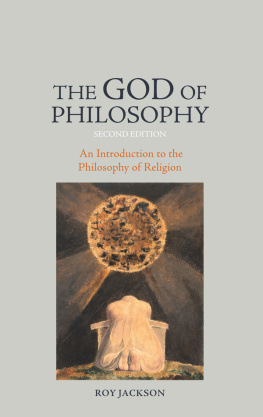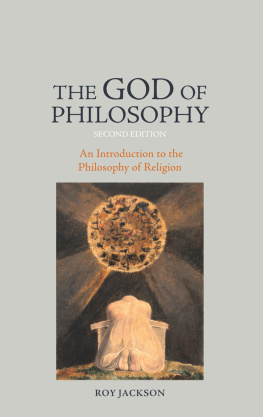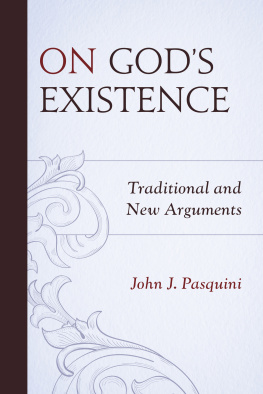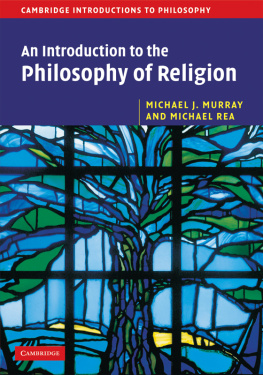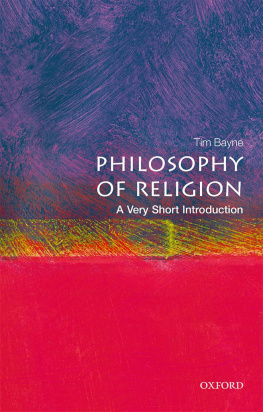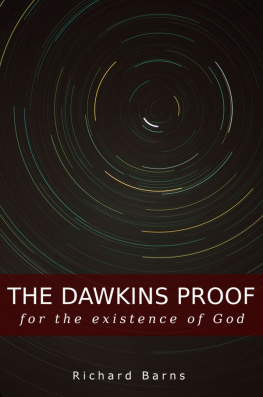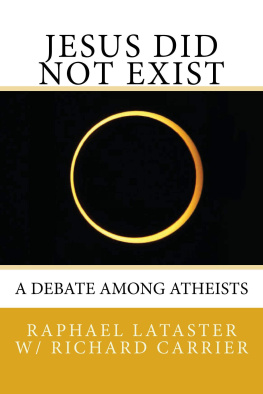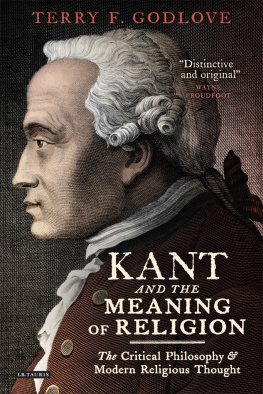The God of Philosophy
The God of Philosophy
AN INTRODUCTION TO THE PHILOSOPHY OF RELIGION
Second edition
Roy Jackson

First published in 2001 by TPM (The Philosophers Magazine).
First published in 2011 by Acumen.
Published 2014 by Routledge
2 Park Square, Milton Park, Abingdon, Oxon OX14 4RN
711 Third Avenue, New York, NY 10017, USA
Routledge is an im print of the Taylor & Francis Group, an informa business
Roy Jackson, 2011
This book is copyright under the Berne Convention.
No reproduction without permission.
All rights reserved. No part of this book may be reprinted or reproduced or utilised in any form or by any electronic, mechanical, or other means, now known or hereafter invented, including photocopying and recording, or in any information storage or retrieval system, without permission in writing from the publishers.
Notices
Practitioners and researchers must always rely on their own experience And knowledge in evaluating and using any information, methods, compounds, or experiments described herein. In using such information or methods they should be mindful of their own safety and the safety of others, including parties for whom they have a professional responsibility.
To the fullest extent of the law, neither the Publisher nor the authors, contributors, or editors, assume any liability for any injury and/or damage to persons or property as a matter of products liability, negligence or otherwise, or from any use or operation of any methods, products, instructions, or ideas contained in the material herein.
ISBN: 978-1-84465-500-7 (hardback)
ISBN: 978-1-84465-501-4 (paperback)
British Library Cataloguing-in-Publication Data
A catalogue record for this book is available from the British Library.
Typeset in Minion Pro.
To Raef and Nadiya
Contents
Whoever attempts to demonstrate the existence of God is an excellent subject for a comedy of higher lunacy.
(Kierkegaard, Philosophical Fragments)
1. Does God exist?
Why attempt to prove that God either exists or does not exist? If you are a religious believer then it is more than likely that you do not require an argument to support your belief. If you are a non-believer, then it is highly unlikely that you will convert on the basis of any of the arguments presented in this book. Ultimately the existence of God cannot be proved one way or the other. Undoubtedly the most important question that this book needs to address is not whether these arguments prove that God exists, but whether it is possible to produce an argument that at least can show that belief can be a credible and rational stance to adopt. It may, in fact, be argued that rationality has nothing to do with belief in God. I say this because of what the Danish philosopher Sren Kierkegaard (181355) states in the quote above, for although he believed that any attempts to prove the existence of God were foolish, he was a religious believer himself despite his own admission that it was irrational and paradoxical. In itself this is an argument: reason cannot prove that God exists, but faith alone is sufficient.
The question of whether or not God exists is one you may well have asked yourself, or others, at some stage in your life. You may well have come to the conclusion that God does indeed exist, that you have a certain and clear idea of God, and that you are comfortable and confident in your beliefs. On the other hand, you may believe in God but you may not be altogether clear what believing in God actually means or entails and you might feel that your beliefs are on somewhat shaky foundations. Perhaps you prefer to leave the question open: you do not know whether God exists or not, so you do not entirely disbelieve in his existence, but nor do you commit yourself to a belief in God. However, you may also be a vehement disbeliever; prepared to argue your case against the existence of any God of any kind and reject all religious belief as a waste of time.
Whatever your viewpoint, the arguments for and against the existence of a God are significant. It is not merely a theological question, but a philosophical one. When someone believes in the existence of God, he or she may well be defending a particular doctrinal viewpoint. For example, the Christian, Muslim, Jew or Sikh would defend belief in one God (monotheism) and would also believe that the rituals and practices associated with their belief help people to come closer to God. This book is not concerned with the specific rituals and practices of religious believers, but rather the consequences and implications of their beliefs. To say that you believe in a God who watches over and protects you raises many questions. What kind of God do you believe in? How does this God watch over you? What are Gods intentions if you are harmed in some way? How does this belief affect your outlook on life and the way you live it? Why do you believe in God but someone else does not? Who is right and who is wrong? Is there such a thing as right and wrong?
2. A word to the wise
Philosophy of religion is a very varied and complex discipline, and there is a need to be very clear in your definitions and terminology. However, many religious believers (I shall often use the term theists for brevity) would uphold the view that the sceptical philosopher is simply barking up the wrong tree by pinning down the theist and asking for definitions, definitions as if that were all religious belief was about. It is a common misunderstanding that belief in God somehow rests upon the strength of the arguments for the existence of God. Undoubtedly, the arguments can strengthen (or, alternatively, weaken) a belief and it is very important to be able to support your beliefs. However, belief in the existence of God does not rest upon philosophical speculation alone.
Further, no one argument should be seen in isolation: they are not meant to be remote, self-contained proofs that God does or does not exist. Rather, they should be seen as a whole, borrowing from each other and being part of a much broader philosophical and theological tradition. In fact, some defer from using the term proof altogether, preferring such phrases as more convincing, more coherent, a stronger defence, just as credible and so forth.
My aim in writing this is primarily to address an audience that is interested in the subject whether studying in a formal way, or just plain interested but not necessarily with an axe to grind. It is a book as much for the non-believer as the believer. As a philosopher, my main interest is to examine the structure and implications of each of the arguments for and against the existence of God; their strengths and their weaknesses, their historical contexts and significance. It is an intellectual enterprise that arouses my curiosity. However, it is also an important subject, I believe, because of its implications.
You will note that many of those who write on the subject of the philosophy of religion tend to belong to one branch or other of Christianity as opposed to other religions. This is largely for historical reasons in that the subject has for a long time been of interest to the Christian tradition, especially because much of its heritage rests within ancient Greek philosophical thought. In this way, philosophy and religion have long been bedfellows and it was not seen as un-Christian to engage in philosophical speculation on theological questions. With certain other religious traditions this has been less the case. Although the same arguments lend themselves to the other great monotheistic traditions such as Judaism and Islam, neither of these traditions despite having strong philosophical elements has laid such a great emphasis on arguments for the existence of God as the Christian tradition. Consequently, this text sticks largely within the boundaries of Christian discourse on the topic, although many of the arguments can be applied to at least the other monotheistic traditions. Concerning the so-called Eastern religions, I remain largely silent. Again, to bring in the theologies of Buddhism and Hinduism, for example, would present a whole series of complex, although interesting, arguments to which a book of this length could not do justice.
Next page
